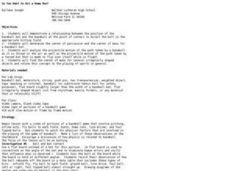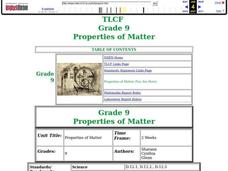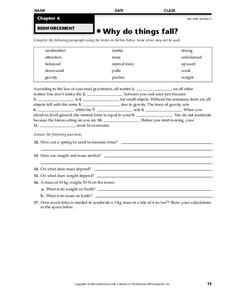Curated OER
So You Want to Hit a Home Run?
Young scholars determine the center of percussion and the center of mass for a baseball bat. In this projective motion lesson students demonstrate the relationship between the position of the baseball bat and when its in the...
Curated OER
Rockets
Students explain the basics of rocketry and explain the relationships between mass, acceleration, and thrust.
Curated OER
Worksheet 1
In this worksheet, students calculate the density, molar mass, and volume of given word problems. Students also calculate the partial pressure of the gases given in the particular problem.
Curated OER
Cold Fronts And Warm Fronts
Students simulate the movement of cold and warm fronts as they listen to a story about the weather and Mr. Sun. They brainstorm the characteristics of each type of front then write about which front they would prefer if they were a...
Curated OER
Clouds, Winds, and Weather
Students observe, record, and report weather conditions to learn how air mass densities determine the weather we experience daily. They demonstrate how clouds form, name clouds and predict the weather.
Curated OER
Students Slide to School on Air-Powered Sled
Students locate the Great Lakes on a US map, then read a news article about a sled being used as a wintertime school bus in Wisconsin. In this current events lesson, the teacher introduces the article with a map and vocabulary activity,...
Curated OER
Air Expansion and Contraction
Pupils observe that air exerts pressure, that heated air expands and that cooled air contracts. After the demonstration, students engage in a question and answer session about what they saw.
Curated OER
The Air Up There!
Students create a model of a column of air and discover one of the reasons why low and high pressure systems exist and why low pressure is often associated with bad weather.
Curated OER
Isotherms and Fronts
In this weather worksheet, students draw in isotherms on a temperature map. Students indicate the location of cold fronts, warm fronts, and stationary fronts. This worksheet has 2 drawing questions.
Curated OER
The Perfect Storm
In this weather worksheet, students read about the mechanics of a hurricane and then complete 4 short answer questions based on the reading.
Curated OER
Nature's Air Conditioner
Students observe the process of transpiration in leaves. They measure how much water a leaf gives off in a 24-hour period, calculate the volume, and answer discussion questions.
Mr. E. Science
Climate and Climate Change
What factors make up climate? How does longitude and latitude affect climate? What is causing Earth's climate to change? These questions are the topic of a presentation that explains characteristics of climate and climate change.
Curated OER
Properties of Matter
Ninth graders explore the molecular structure of matter and how it can affect the physical characteristics of a specific material. They demonstrate that isotopes of an element have different masses. Students demonstrate that the rates of...
Curated OER
How Can You Tell One Clear Gas From Another?
Fifth graders perform experiments to determine the identity of an unknown gas sample. In this chemistry lesson, 5th graders fill balloons with air, oxygen, hydrogen, and carbon dioxide. They use mass and reactivity to identify the gases.
Curated OER
Composting
Using 2-liter bottles, junior ecologists create composting tubes in which they place nitrogen-rich and carbon-rich materials. They observe what changes occur over two weeks' time. Provide more specific direction to your class as to what...
Curated OER
Forces
These simple slides are basic, but clear, in their summary of physical forces. Definitions of friction, air resistance, gravity, freefall and projectiles are given along with a couple of helpful diagrams. More examples always help to...
Curated OER
Weight, Friction, Equilibrium
In this weight learning exercise, students review the equation for solving for the force of weight and review the kinds of friction. Students complete 10 matching, 7 fill in the blank, and 8 problems to solve.
Curated OER
Guess What?!
Students explore how scientists work. In this scientific method lesson, students use their senses to identify objects they cannot see. Students are asked to think like scientists and make observations, comparisons, and interferences, as...
Curated OER
Water Rocket
Students study the basic operation of a water rocket. In this propulsionlesson students complete several experiments on constructing a bottle rocket launcher.
Curated OER
Why Do Things Fall?
For this science worksheet, students complete a paragraph using 15 given terms. For example, "How can a spring be used to measure force?"
Curated OER
Atoms
In this atoms worksheet, students circle the term in parentheses that makes the 20 statements correct. The statements review the parts of an atom, isotopes, and basic matter principles.
Curated OER
Chemical Equations and Stoichiometry
In this chemical equations worksheet, learners calculate how many grams are used to in the equation written as well as the grams formed in the chemical equation. Students identify the limiting reagent in some of the chemical equations....
Curated OER
Ideal Gas Law Worksheet
In this ideal gas law worksheet, students complete 8 problem solving questions to find pressure, volume and temperature of given gases.
American Museum of Natural History
Space Jell-O
Might as well learn about how space bends around massive objects while making dessert. A remote learning resource provides an opportunity for scholars to model how stars and planets bend space. They use Jell-O to represent space and...
Other popular searches
- Air Masses and Fronts
- Weather Fronts Air Masses
- Cold Air Masses
- Air Masses and Weather
- Weather Air Masses
- Weather Fronts and Air Masses
- Air Masses Oklahoma
- Polar Air Masses
- Air Masses Collide
- Air Masses Fronts
- Air Masses, Fronts
- Air Masses and Air Fronts























